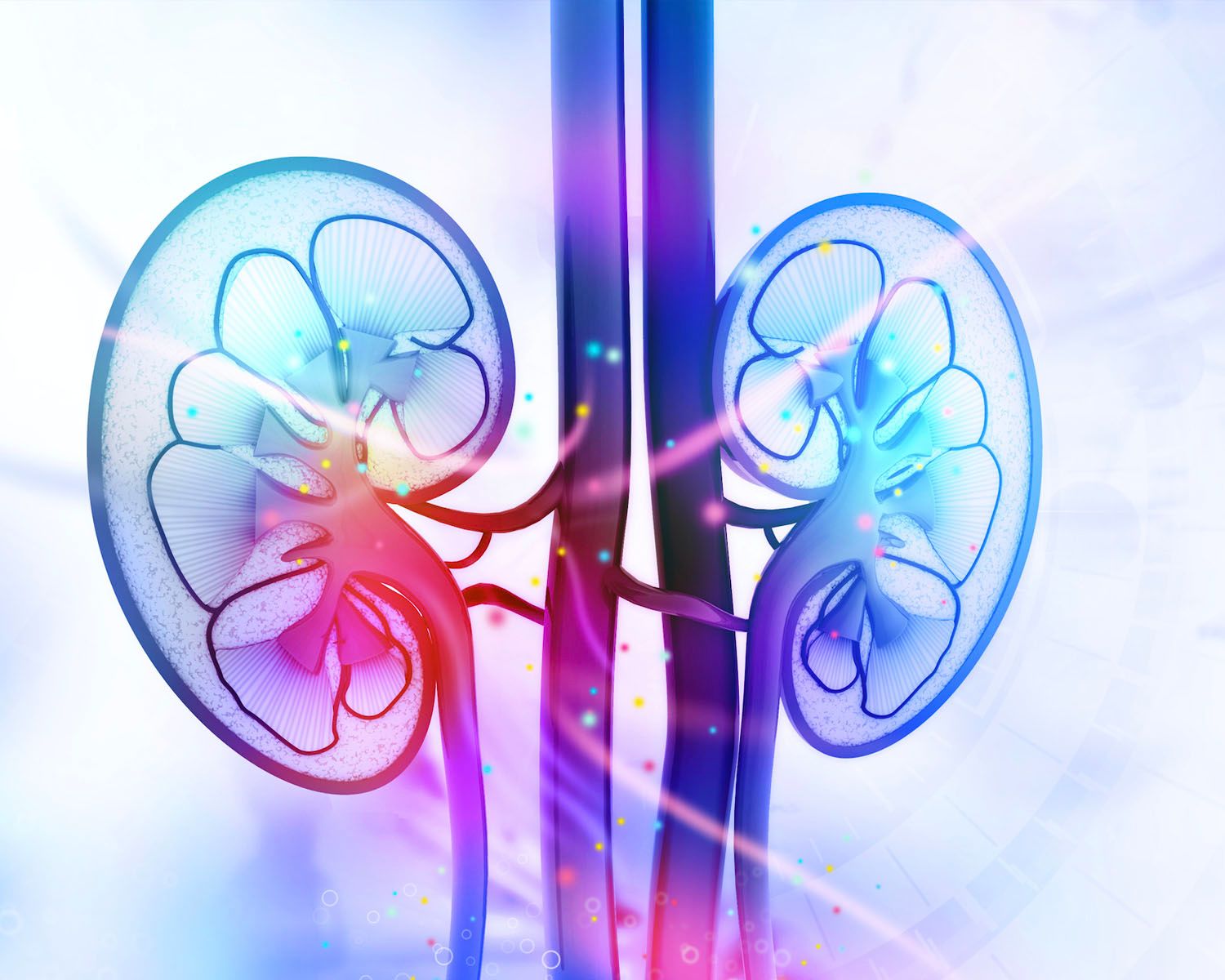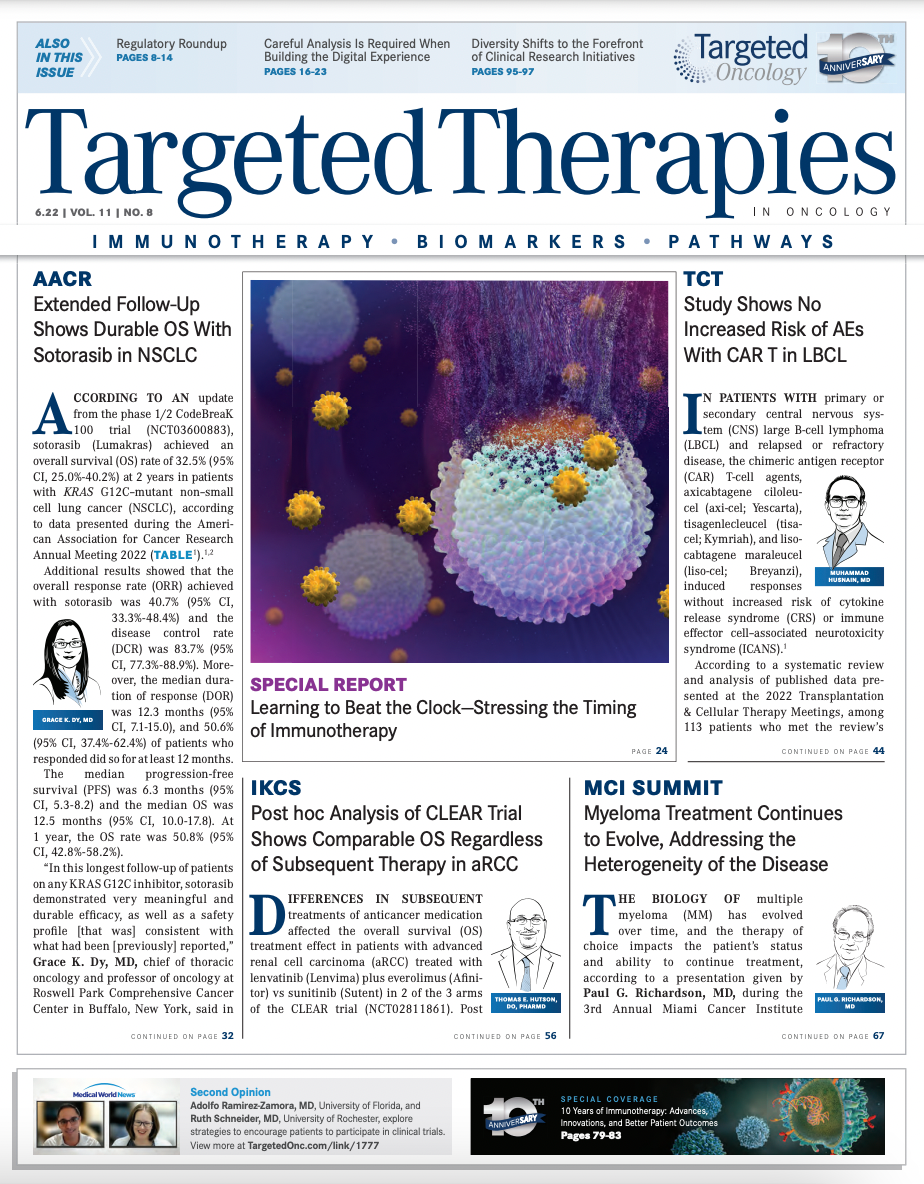Triplet Combination Data Add Evidence to Clinical Activity in aRCC
Data regarding the triplet combination of nivolumab, ipilimumab, and cabozantinib show clinical activity across multiple tumor types, giving a preview of future outcomes in patients with untreated, advanced renal cell carcinoma.

Explortatory efficacy results from the CheckMate 9ER study reveal evidence of clinical activity of the triplet combination of nivolumab (Opdivo) plus ipilimumab (Yervoy) plus cabozantinib (Cabometyx) across multiple tumor types, giving a preview of future outcomes in patients with untreated, advanced renal cell carcinoma (aRCC). These data from the third treatment cohort of CheckMate 9ER (NCT03141177) were presented at the International Kidney Cancer Symposium: Europe in Antwerp, Belgium by Bernard Escudier, MD, of Gustave Roussy in Villejuif, France.1
This triplet reached the primary end point of progression-free survival (PFS) by blinded independent central review (BICR) with a median of 9.9 months (95% CI, 5.7-16.8). Median PFS was found to be 13.9 months (95% CI, 7.3-24.7) by investigator assessment.
Escudier explained that the original intent of CheckMate 9ER was to compare nivolumab plus ipilimumab vs sunitinib (Sutent) and nivolumab plus ipilimumab plus cabozantinib vs sunitinib in patients with untreated aRCC; however, CheckMate 214 (NCT02231749) revealed beneficial survival data with nivolumab plus ipilimumab,2 deeming the triplet unnecessary. Despite the early discontinuation, these exploratory effi cacy data collected from a database from June 2021 regarding the triplet combination hold significance.
Patients in CheckMate 9ER were randomized 1:1:1 to receive nivolumab plus ipilimumab; sunitinib; or the triplet combination. Patients in the triplet arm (n = 50) received 3 mg/kg nivolumab and 1 mg/kg ipilimumab intravenously (IV) every 3 weeks plus 40 mg cabozantinib taken orally once a day, followed by 240 mg nivolumab IV every 2 weeks plus 40 mg cabozantinib taken orally once a day. Patients were included if they had previously untreated or advanced aRCC, a clear-cell component, and any International Metastatic RCC Database Consortium (IMDC) risk. Secondary end points were overall survival (OS), objective response rate (ORR) by BICR, and safety. Exploratory end points included PFS and ORR per investigator assessment.
As of June 2021, the extended median follow-up for this cohort for OS was 39.1 months (range, 33.4-44.5). Median OS was 37 months (95% CI, 31.8–not estimable).
The triplet cohort’s ORR per BICR was 44% (95% CI, 30.0%-58.7%), and the ORR per investigator assessment was 48% (95% CI, 33.7%-62.6%). According to BICR, 4 patients (8%) had a complete response, 18 patients (36%) had a partial response, 19 patients (38%) had stable disease, and 4 patients (8%) had progressive disease. Investigators could not determine responses from 5 patients (10%). The median time to response was 2.8 months (range, 2.6-4.2). The median duration of response was 21.4 months (95% CI, 13.8-30.6).
The median age of the triplet arm was 60 years (range, 40-84), and 68% of patients were male. Ten patients (20%) were from the United States, 11 (22%) from Mexico, 11 (22%) from China, and the rest were from other nations, mostly Canada or European countries. Most patients had an IMDC prognostic score of intermediate (62%), with 22% scoring favorably and 8% scoring poorly. Most patients had tumor PD-L1 expression less than 1% or indeterminate (70%), and 28% of patients had PD-L1 expression of 1% or greater. One patient (2%) was not evaluable for PD-L1 expression. Ninety percent of patients had at least 2 sites with target or nontargeted lesions and the rest (10%) had just 1 site. The sites for metastases were found in the lung (n = 34; 68%), lymph nodes (n = 23; 48%), bones (n = 13, 26%), and liver (n = 11; 22%).
The median duration of therapy for the triplet regimen was 11.2 months (range, 1.9-23.7), 2.1 months (range, 1.4-2.3), and 11 months (range, 4.7-28.3) for nivolumab, ipilimumab, and cabozantinib, respectively. At least 1 dose delay occurred with nivolumab in 39 patients (78%), ipilimumab in 19 patients (38%), and cabozantinib in 43 patients (87.8%). Dose reduction only occurred in cabozantinib among 33 patients (67.3%). Forty-five patients (90%) experienced treatment discontinuation. Discontinuations were a product of disease progression in 24 patients and drug toxicity in 11 patients.
Treatment-related adverse events (TRAEs) led to treatment discontinuation in 23 patients (46%). In this triplet cohort, TRAEs with nivolumab plus ipilimumab led to discontinuation in 9 patients; the cabozantinib component affected 5 patients; and the triplet combination led to discontinuation in 9 patients, 8 of whom occurred all at once and 1 sequentially.
The most common any-grade TRAEs included diarrhea (54%), increased alanine aminotransferase (48%), increased aspartate aminotransferase (38%), and palmar-plantar erythrodysesthesia (38%). Forty-two patients (84%) experienced at least 1 grade 3 to 4 TRAE, whereas no patients had any grade 5 TRAEs. Escudier noted that 6 patients (12%) discontinued all treatment within 6 months because of treatment-related hepatic AEs.
Investigators found 20 patients (40%) had at least 1 grade 3 to 4 immune-mediated hepatic AE, defined as an AE reported between the first dose and 100 days after the last dose requiring immune-modulation medication treatment. These grade 3 to 4 immunemediated hepatic AEs had a median time to onset of 8.9 weeks (range, 3.1-28.7). Highdose corticosteroids were administered to 26 patients (52%) to manage these types of AEs.
Subsequent therapy occurred in 22 patients (44%); 20 of them (40%) received subsequent systemic therapy. Systemic therapies included any VEGF receptor inhibitors (n = 17; 34%), any mTOR inhibitors (n = 4; 8%), and any PD-1 or PD-L1 inhibitors (n = 2; 4%).
Escudier concluded, “Efficacy data should be considered exploratory in these 50 patients. It certainly adds evidence to what we can think about [nivolumab plus ipilimumab plus cabozantinib] data, and it’s quite consistent for what we have across multiple tumor subtypes. Efficacy and safety data should be interpreted in the context of the patients’ demographics and limited experience with triplet regimens.”
This triplet regimen is being further studied in patients with RCC. The phase 3 COSMIC-313 trial (NCT03937219) is evaluating the triplet vs nivolumab plus ipilimumab in patients with intermediate-risk or poor-risk, previously untreated RCC.3
REFERENCES
1. Escudier B. Abstract 1: Nivolumab plus ipilimumab plus cabozantinib for previously untreated advanced renal cell carcinoma: results from a discontinued study arm of CheckMate 9ER. Presented at: International Kidney Cancer Symposium: Europe; April 22-April 24, 2022; Antwerp Belgium. May 16, 2022. https://bit.ly/3wvv7cc
2. Motzer RJ, Tannir NM, McDermott DF, et al; CheckMate 214 Investigators. Nivolumab plus ipilimumab versus sunitinib in advanced renal-cell carcinoma. N Engl J Med. 2018;378(14):1277-1290. doi:10.1056/NEJMoa1712126
3. Hofmann F, Hwang EC, Lam TB, et al. Targeted therapy for metastatic renal cell carcinoma. Cochrane Database Syst Rev. 2020;10(10):CD012796. doi:10.1002/14651858.CD012796.pub2

Enhancing Precision in Immunotherapy: CD8 PET-Avidity in RCC
March 1st 2024In this episode of Emerging Experts, Peter Zang, MD, highlights research on baseline CD8 lymph node avidity with 89-Zr-crefmirlimab for the treatment of patients with metastatic renal cell carcinoma and response to immunotherapy.
Listen
Beyond the First-Line: Economides on Advancing Therapies in RCC
February 1st 2024In our 4th episode of Emerging Experts, Minas P. Economides, MD, unveils the challenges and opportunities for renal cell carcinoma treatment, focusing on the lack of therapies available in the second-line setting.
Listen